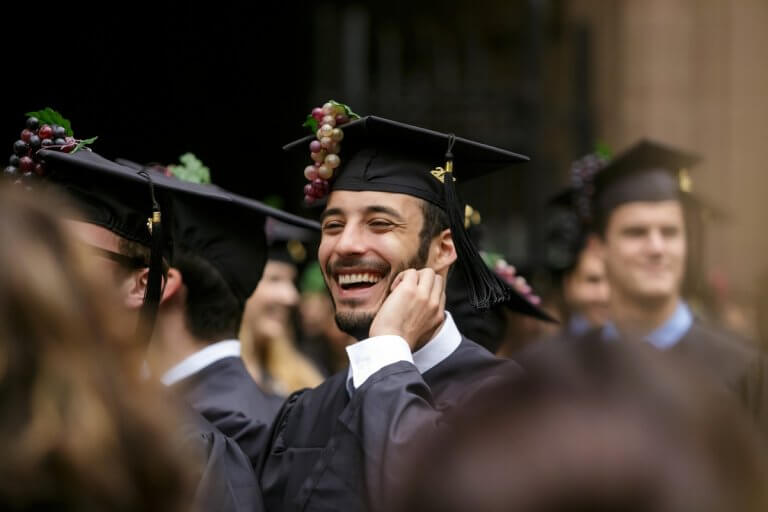
In the complex web of factors deciding who gets into the world’s most elite universities, one controversial factor stands out among them all: legacy status.
Legacy students refer to those with a family connection to someone who had graduated from the same institution. A 2018 survey of Admissions Directors by Inside Higher Ed found that it’s a factor in admissions decisions at 42 percent of private institutions and six percent in public institutions.
But it’s the weight of this status given by admission offices at the country’s most elite universities that elicit the most outcry. The Guardian notes that the acceptance rate for this group of students, who traditionally come from white and wealthy families, is about 33 percent – the school’s overall acceptance rate is only a fraction of that, at under six percent.

Harvard University students at the School of Education hold up books as their degree is announced during commencement ceremonies. Source: AFP/Darren McCollester
At Princeton, legacy admissions are four times the overall rate, while Notre Dame and Georgetown’s are about twice their overall admission rates.
At the University of Pennsylvania, students whose parents or grandparents attended Penn and who applied through Early Decision benefits from an admission rate of 40 percent, while the overall admission rate is just 10 percent.
Columbia University gives legacy status a “slight advantage” when similarly qualified applicants are competing, NPR reported, as do the University of Virginia and Stanford University.
For comparison, international students form around nine percent of the admit pool at Cornell to 12 percent of the pools at Harvard and Princeton, according to The Crimson.
Speaking to The Guardian, Andrea Bian, a Chinese-descent journalism student at Northwestern University, said legacy students “do tend to be white, and they do tend to be wealthier.”
“I think that’s kind of unfair,” she adds.
The issue of legacy students and their impact on similarly (or better qualified) applicants are being heatedly debated in the US today. A high-profile lawsuit against Harvard on the allegation of discriminating against Asian Americans said the Ivy League’s admissions office gives lower than average “personal ratings” to applicants of Asian descent. While the plaintiffs are arguing for race to be removed from the admissions process, it’s also placed scrutiny on the issues of wealth and privilege at elite universities.
How elite US schools give preference to wealthy and white ‘legacy’ applicants https://t.co/4RfAOxLgA9
— The Guardian (@guardian) January 23, 2019
“Harvard steadfastly refuses to even contemplate giving up legacy and donor preferences,” Adam Mortara, a lawyer for the plaintiffs said in his opening remarks.
He then asked Rakesh Khurana, Dean of Harvard College: “What is so special about wealthy people that Harvard needs to have them overrepresented by a factor of six on its campus?” Khurana dodged the question.
Lawyers also shared internal emails sent to Harvard’s Director of Admissions, including one sent by the head of Harvard Kennedy School after finding out that legacy applicants with connection to potential donors, had been accepted.
“Once again you have done wonders…I am simply thrilled by all the folks you were able to admit.” One donor, he added, “has already committed to a building”.
The trial, and its renewed exposure on legacy preferences, are spurring students to demand for more transparency from their colleges and universities. Student groups at Princeton, Cornell, Brown and Columbia have organised discussions and petitions for this.
Bian, who followed the Harvard trial, couldn’t find such stats on legacy status impact at Northwestern. “I just wish that universities would be more transparent,” she said. “I think that would build more trust between universities and the general public.”
Liked this? Then you’ll love…
How Gaokao scores for study admission opens doors for Chinese students
No more race in US admission decisions: Will international students be affected?







